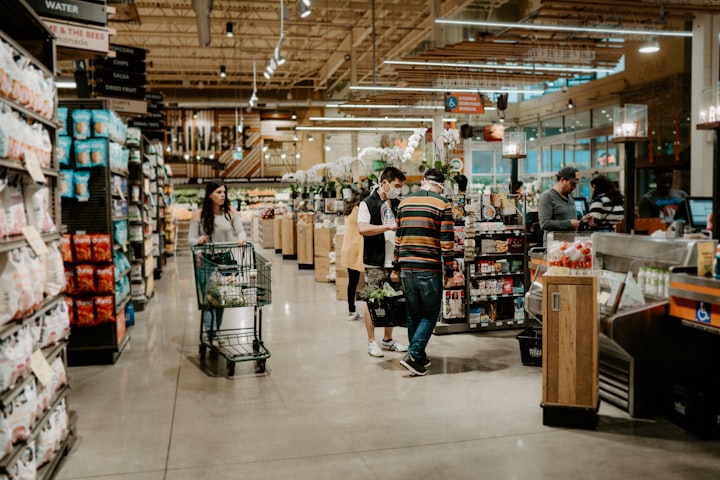Unveiling the Truth About Ultra-Processed Foods:
Risks, Dangers, and the Path to Organic Food Alternatives

Introduction :
In our modern world, ultra-processed foods have become increasingly prevalent. These convenient and often tempting food options line supermarket shelves, but they come with a hidden cost. In this article, we will delve into the realm of ultra-processed foods, exploring their definition, the potential benefits (if any), the inherent dangers and health risks they pose, and offer practical ideas to replace them with organic, whole food alternatives. Join us as we embark on a journey toward a healthier and more sustainable approach to nourishing our bodies.
1. Understanding Ultra-Processed Foods:
Ultra-processed foods are food products that undergo extensive processing and contain numerous additives, preservatives, and artificial ingredients. These foods are typically made from refined ingredients, including sugars, oils, flours, and additives, and undergo multiple industrial processes. Examples include packaged snacks, sugary cereals, fast food items, and processed meats. Ultra-processed foods are known for their high levels of added sugars, unhealthy fats, sodium, and low nutrient density. They often lack the essential fiber, vitamins, and minerals that whole, unprocessed foods offer.
2. The Perceived Benefits :
While ultra-processed foods may offer convenience and immediate gratification, their benefits are largely overshadowed by their detrimental effects on health. Some argue that these foods provide affordability, longer shelf life, and ease of preparation. However, these advantages must be weighed against the long-term consequences they can have on our well-being.
3. The Dangers and Health Risks:
Consuming a diet high in ultra-processed foods has been linked to numerous health risks. Studies have shown that excessive intake of these foods can contribute to obesity, type 2 diabetes, cardiovascular diseases, and other chronic health conditions. Their high levels of added sugars, unhealthy fats, and sodium can lead to imbalances in the diet, weight gain, and an increased risk of developing metabolic disorders. Moreover, the lack of essential nutrients in ultra-processed foods can lead to deficiencies, poor gut health, and impaired overall well-being.
4. Embracing Organic and Whole Food Alternatives:
Replacing ultra-processed foods with organic and whole food alternatives is a key step towards a healthier lifestyle. Here are some practical ideas to incorporate into your dietary habits:
a. Prioritize Whole Foods: Opt for fresh fruits, vegetables, whole grains, lean proteins, and unprocessed sources of fats. These whole foods are naturally nutrient-dense and provide essential vitamins, minerals, fiber, and antioxidants.
b. Cook at Home: Prepare homemade meals using fresh ingredients whenever possible. This allows you to have full control over the quality and composition of your meals.
c. Plan and Prep: Plan your meals in advance and prepare ingredients ahead of time to make healthier choices more convenient.
d. Explore Farmers Markets: Visit local farmers markets to access fresh, organic produce and support local farmers.
e. Read Labels: Be mindful of food labels and ingredient lists. Opt for products with minimal processing, recognizable ingredients, and no or limited additives.
f. Limit Processed Foods: If opting for processed foods, choose options with minimal processing and a short list of whole, natural ingredients.
Here are a few natural ways of preservations at home ;
1. Preservation through Freezing :
One of the simplest and effective methods of food preservation is freezing. Freezing can help retain the nutritional value of many foods while extending their shelf life. Invest in a quality freezer and use airtight containers or freezer bags to store fruits, vegetables, meats, and even prepared meals. Properly label and date each item to ensure freshness and easy identification.
2. Canning and Pickling :
Canning and pickling are traditional methods of food preservation that can be done at home. Canning involves sealing food in jars or cans and using
heat to kill bacteria and prevent spoilage. Fruits, jams, sauces, and even vegetables can be preserved through this method. Pickling, on the other hand, involves immersing food in a mixture of vinegar, salt, and spices, which helps preserve the flavors and extend the shelf life of various vegetables.
3. Dehydration and Drying:
Dehydration is another natural way to preserve food without extensive industrial processing. Fruits, vegetables, herbs, and even meats can be dehydrated using a food dehydrator, an oven on low heat, or by air-drying. Dehydrated foods can be stored in airtight containers and rehydrated when needed. Drying is also a popular method for preserving herbs, flowers, and spices.
4. Fermentation :
Fermentation is a traditional preservation method that not only extends the shelf life of food but also enhances its flavor and nutritional value. Foods like sauerkraut, kimchi, yogurt, and kombucha are made through the process of fermentation. The natural bacteria and yeasts present in these foods convert sugars and carbohydrates into beneficial compounds, such as probiotics and organic acids. Fermented foods can be stored in a cool place or refrigerated for longer shelf life.
5. Root Cellaring :
Root cellaring is an age-old method of storing certain fruits and vegetables in a cool, dark, and humid environment. Ideal for crops like potatoes, carrots, beets, onions, and apples, a root cellar provides the right conditions to slow down spoilage and maintain freshness for an extended period. It is a low-tech and energy-efficient approach to food storage, making use of the natural properties of the earth.
By exploring these alternative methods of food storage, you can reduce your reliance on extensive industrial processing. These techniques not only preserve the nutritional value of food but also offer the opportunity to enjoy seasonal produce year-round, support local farming, and embrace a more sustainable approach to food consumption.
Finding ways to store food without relying on extensive industrial processes is a step towards a more natural and sustainable lifestyle. Whether through freezing, canning, dehydrating, fermenting, or root cellaring, we can preserve the flavors and nutritional benefits of food while reducing our dependence on processed and packaged alternatives.
Conclusion :
Ultra-processed foods may offer convenience, but the health risks they pose cannot be ignored. By understanding the dangers associated with these foods and embracing organic, whole food alternatives, we can prioritize our well-being and pave the way for a more sustainable and nourishing approach to our diets. Let's make informed choices that support our health and longevity.





Comments
There are no comments for this story
Be the first to respond and start the conversation.